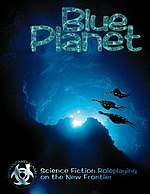Blue Planet (role-playing game)
Blue Planet is an environmentalist science fiction role-playing game first published by Biohazard Games in 1997, set on the planet Poseidon.
 The cover of Blue Planet 1st version | |
| Designer(s) | Jeff Barber, Greg Benage, Jim Heivilin, and Jason Werner |
|---|---|
| Publisher(s) | Biohazard Games (BPv1) Fantasy Flight Games (BPv2) RedBrick (BPv2) FASA Games (BPR) |
| Publication date | 1997 (BPv1) 2000 (BPv2) 2012 (BPR) 2019 (BPv3) |
| Genre(s) | Science fiction |
| System(s) | Custom (BPv1) Custom "Synergy Game System" (BPv2) Custom "Synergy Game System Revised" (BPR) |
Setting
Blue Planet is set on the alien water world Poseidon, where human colonists fleeing an irreparably damaged Earth, Terran megacorporations looking for a rare ore and the indigenous aliens who live in the extensive oceans clash over how to use and steward the planet's resources.[1]
The game includes genetically "uplifted" dolphins and orcas as playable characters on either side of the native/Terran dichotomy.
First edition (BPv1): Biohazard Games
The first edition (BPv1), a 348-page book[1] dedicated to Jacques Cousteau, was demonstrated and released at Origins in 1997 to critical acclaim, receiving a nomination for the Game of the Year Origins award. Approximately 250 of the 348 pages of the rulebook are dedicated to background about the planet Poseidon.[1]
The first edition uses a complex percentile (d100) system to resolve combat that involves the use of hit locations.
Reception
The reviewer from Pyramid #30 (March/April, 1998) stated that "When I first picked up a copy of Blue Planet, I was mesmerized by the cover. It has the same strange and soothing attraction of looking into a fish bowl. To my delight, the cover art accurately represents the beauty and depth of the world inside."[2]
In the August 1998 edition of Dragon (Issue 250), Ray Winninger was impressed by the body of research behind this game. However, despite all of the detail, Winninger noted that "Conspicuously absent among all the background material is solid advice on how to create and run adventures... it would have been nice to get some of the designers’ thoughts on how to use all that comprehensive background information as a backdrop for satisfying stories." He concluded with a guarded recommendation: "Blue Planet‘s setting is one of the most creative and unusual in recent memory. The rulebook houses enough detailed material to keep an enterprising GM going for months. The rules, however, are a bit too complex and scant for the tastes of many players."[1]
Second edition (BPv2): Fantasy Flight Games
A second edition of the game (BPv2) was published in 2000 by Fantasy Flight Games as a series of several books. This edition uses a new role-playing game system called the Synergy Game System that streamlined and simplified the complex combat system of the first edition. Instead of percentile dice, the second edition uses one to three 10-sided dice, a new initiative system, and abstract armor and damage modeling.
In 2002, Steve Jackson Games produced a GURPS version of Blue Planet under license from Fantasy Flight Games.
Third edition (BPv3): Biohazard Games
In 2019, excited at the prospect of giving BLUE PLANET an overdue upgrade—and the opportunity to offer BLUE PLANET to new generations of gamers—the original creators at Biohazard Games teamed up with Gallant Knight Games to produce BLUE PLANET: RECONTACT, the third edition of the classic game. RECONTACT features a modern evolution of the second edition mechanics with fully updated technological, scientific, and sociological worldbuilding.
Further products
In 2004, the intellectual property of Blue Planet passed back from Fantasy Flight Games to Biohazard Games.
In 2008, RedBrick reprinted Ancient Echoes, the cetacean sourcebook for the second edition, which had been originally printed in very small numbers by Fantasy Flight Games.
In 2012, FASA Games published the Blue Planet Revised Edition (BPR), an updated version of the second edition.
In 2015, the intellectual property of Blue Planet passed back to a newly resurrected Biohazard Games.
References
- Winninger, Ray (August 1998). "Roleplaying Reviews". Dragon. TSR, Inc. (250): 109.
- "Pyramid: Pyramid Pick: Blue Planet". Sjgames.com. Retrieved 2020-02-06.